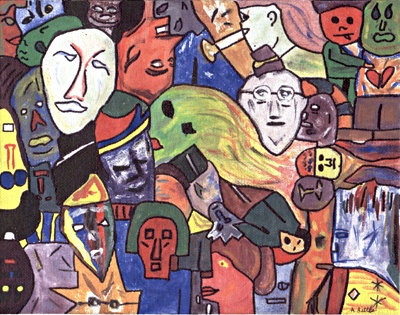All Nonfiction
- Bullying
- Books
- Academic
- Author Interviews
- Celebrity interviews
- College Articles
- College Essays
- Educator of the Year
- Heroes
- Interviews
- Memoir
- Personal Experience
- Sports
- Travel & Culture
All Opinions
- Bullying
- Current Events / Politics
- Discrimination
- Drugs / Alcohol / Smoking
- Entertainment / Celebrities
- Environment
- Love / Relationships
- Movies / Music / TV
- Pop Culture / Trends
- School / College
- Social Issues / Civics
- Spirituality / Religion
- Sports / Hobbies
All Hot Topics
- Bullying
- Community Service
- Environment
- Health
- Letters to the Editor
- Pride & Prejudice
- What Matters
- Back
Summer Guide
- Program Links
- Program Reviews
- Back
College Guide
- College Links
- College Reviews
- College Essays
- College Articles
- Back
Making Sense of It.
Everyone in my generation shares a similar experience.
Our childhood was filled with lessons about tolerance.
Our teachers, parents, books and television would say, “We all look and sound different on the outside, but everyone should be cared for and treated as equals.”
My friends and I would look at each other, shrug, and say, “Makes sense to us.”
So in elementary school, when I saw the occasional fight on the playground, or a classmate sitting alone at lunch, I figured it wasn’t such a big deal and that the problem would fade away eventually.
And in middle school, the kid with the learning disability received snickers from the other side of the classroom. And the boy with the weight problem was ignored on Instant Messenger.
Often, there was an intervention. A good friend, a guidance counselor, maybe even the principal.
And we would think: “Good. This issue is over and done with.” And the problem would be fixed because we would think of how we’d all been taught the importance of tolerance. We would shrug and say, “It still makes sense to us.”
But when we reached high school, the teenager who didn’t want to drink with her friends one Saturday wasn’t invited to the next party. The black student was always asked by kids in the hallway to rap for them, or drop a beat. I was told that I was lucky to be Jewish, because it helped me make the Honor Roll.
And information regarding the deaths of Phoebe Prince and Tyler Clementi started appearing all over the television, the newspapers, and the blogs.
The messages we learned as children stopped making sense to me. Because why believe that we are all deserving of our basic human rights, if I often felt alone in that opinion?
We don’t watch Sesame Street after school anymore to unknowingly receive lessons on acceptance. We turn to Facebook, Twitter, and YouTube, our new pastimes, to indulge in our own social lives.
But we recognize that there’s a problem. We have tried to stop the perpetrators, and have lent our hands to the victims.
We have started campaigns and made overnight YouTube sensations to help stop genocide and abuse all over the world.
We have successfully advocated for the repeal of laws that force our servicemen and women’s to hide their true identities.
We have worn hoodies and protested to stand up for the unjustly killed.
And there is no doubt that we should continue to do these things.
But whether it’s due to the real-life tragedies on the news, or the hours of exhausting homework we all had tonight, our childhood lessons are becoming hazy. Something learned years ago has been lost on my generation.
We bully and hate and judge what we do not know, or wish to understand. It doesn’t matter what age we are.
So we need to keep educating ourselves. The message shouldn’t stop when we’ve outgrown Sesame Street.
I wouldn’t mind being tweeted about tolerance every day, if that’s what it took to help my generation.

Similar Articles
JOIN THE DISCUSSION
This article has 0 comments.
